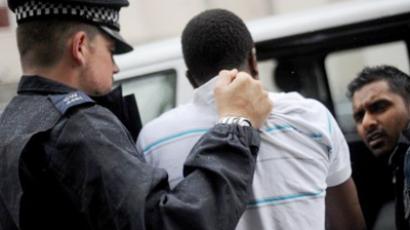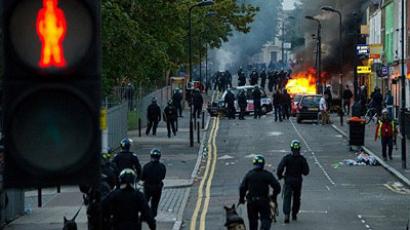British public sector rises up as 200,000 strike against cuts and reforms (VIDEO)
As many as 200,000 angry public sector workers staged a day of protest on Thursday, taking to the streets of London to voice their disgust at proposed government cuts.
Among the demonstrators were civil servants, lecturers, health workers, Ministry of Defence staff, and immigration officers – fueled by ministers' vows to press ahead with the controversial reforms, made clear in yesterday's Queen's Speech.About 20,000 off-duty police officers from all 43 forces across England and Wales also took to the capital for the first police march there in more than four years. The officers, banned from striking under law, were protesting against 20 per cent cuts to the national police budget and proposals for the most wide-ranging reform of pay and conditions seen in more than 30 years. 16,000 officers wore black caps to represent expected job losses over the next four years.Paul McKeever, the Police Federation's chairman, said: "We're at the lowest ebb I can ever remember.""We're not against change," McKeever said. "What we're against is ill-informed change based on ideology which is going to damage the service, damage officers and most importantly damage the public as well."One of the lead government negotiators on public sector pension reforms, cabinet secretary Francis Maude, described the strikes as "futile" and insisted that talks over pensions will not be reopened: "It is very disappointing that a handful of unions insist on carrying on with futile strike action which will benefit no one.""We would urge these union leaders to reconsider their position. Pension talks will not be reopened and nothing further will be achieved through strike action."Thursday's one-day walkout marked the third major strike by public sector employees over pension reform in the past six months.It was led by the Public and Commercial Services (PCS) civil servants' union, health workers from the Unite union, teachers and lecturers from the University and College Union, the Nipsa civil servants' union in Northern Ireland and Royal Navy support staff at the RMT union.Tens of thousands of lecturers from at least 75 universities and university colleges also took part in the walkout over pension cuts. When the changes are introduced in 2015, lecturers will see their contributions rise by 50% and many will have to work until the age of 67 or 68, rather than 65.Also, tourists and Londoners alike are bracing themselves for further possible transport upheavals during the upcoming Olympics. Unite has called on thousands of bus workers to vote on strikes in a row over payments during the Games.
No right to strike
Under the Police Act of 1996, British police are banned from striking or from joining unions. The ban has been in place since a 1919 incident when almost every constable and sergeant refused to go on duty, causing havoc in London and Liverpool.Speaking on Thursday, Julie Nesbit of the Police Federation – which represents 124,000 rank and file officers – told BBC Radio 4’s Today program that the ban on industrial action put the force at a disadvantage compared with other public sector employees."We don't have industrial rights and we cannot do anything about the poor treatment we are receiving," Nesbit said. She added, "the police service is the ultimate public service. We are the people without whom the rest of the public services cannot function."Meanwhile, the government said it was considering court action against striking prison officers, claiming the walkout was unlawful.Michael Spurr, chief executive of the National Offender Management Service (Noms), said: "I am extremely disappointed that the POA has taken this unlawful action.""We have implemented our contingency plans, and our priority is to protect the public and ensure that prisons remain safe and secure."Unite Assistant General Secretary Gail Cartmail defended Thursday's walkout: "Today's industrial action will build on the high level of anger that was on display during the November 30 strikes. This anger has been increased by the government's hardline insistence that public sector employees work longer, pay more and receive less when they eventually retire."A national strike by around a million public sector workers on November 30 of last year was followed by a series of outline agreements for civil service, health, education and local government employees. Pension reforms were included in the Queen's speech, despite opposition to changes.However, speaking on Thursday, Prime Minister David Cameron's spokesman stood by the austerity program: “This government inherited the highest deficit in the G20. Dealing with that deficit has involved some tough decisions. One of those has been to reform public service pensions."Government ministers from across the political spectrum criticized the protests. Immigration Minister Damian Green said: "This strike is completely unnecessary and we believe the public will find it unacceptable. The security of the UK border is of the utmost importance and we will use contingency plans to ensure we minimize any disruption caused by planned union action."














